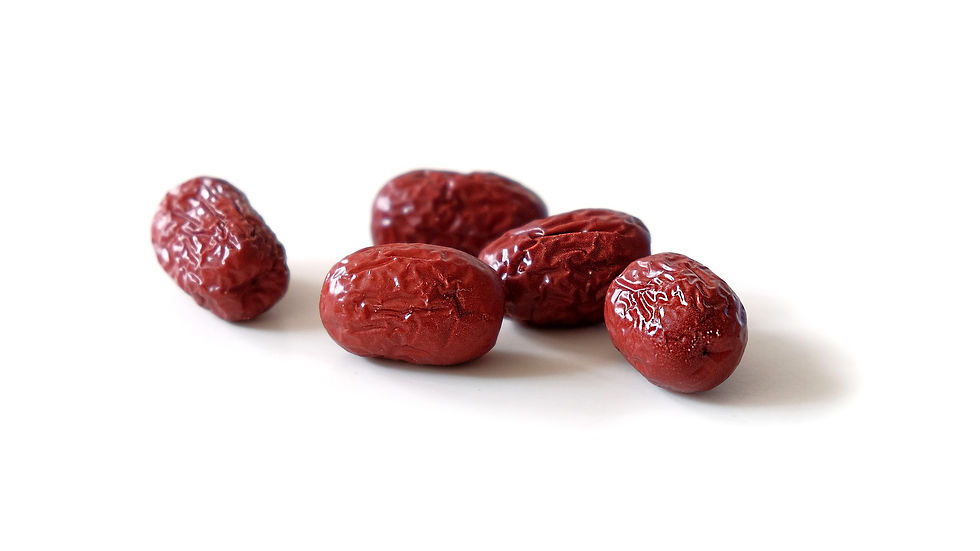Understanding TCM: Blood (or Xue) 血
- Nov 3, 2020
- 3 min read
When talking about Blood, there are similarities and differences between the western medical perspective and that of TCM. Both sides agree that Blood is essential to life and it carries nutrients to nourish other body parts. However, ‘Blood’ in TCM is a broad term that goes way beyond just a bodily fluid. Let’s dig a little deeper into the concept of Blood in term of TCM.
What is the basic concept of Blood?
Blood came from two main sources: Food Essence水穀精微 and Jing精. Food is digested and turned into food essence by Spleen and Stomach (TCM organ system will be discussed in our next article. Stay tuned!). With the help of Heart and Lung, food essence is finally transformed into Blood. Jing is an essence that stored in Kidney. It generates bone marrow which in turn can produce Blood. Blood flows within the blood vessels as well as within the meridians. Heart plays an important role in governing Blood circulation whereas Liver stores Blood.
Blood is inseparable from Qi, they always work synergistically. As an old saying goes, ‘Qi is the commander of Blood, when Qi moves, Blood moves; Blood is the mother of Qi, where Blood goes, Qi goes.’
What are the functions of Blood?
1. Nourishment: All our organs, bones, muscles, tendons and skin depend on the nourishment of Blood in order to maintain their normal physiological activities.
2. Moisturization: Blood moistens body tissues to prevent them from drying out. Healthy skin, nails and hair require a good blood supply.
3. Foundation of mental activities: Blood is the substantial basis of the mind. (i.e. Shen神, meaning one’s thoughts, emotions and psychological state. )
How do you know when there is Blood disharmony?
Blood tends to get deficient (i.e. Blood deficiency 血虛) or stagnant (i.e. Blood stagnation血瘀).
In TCM, Blood deficiency doesn’t completely correspond to the concept of anemia in modern medicine. Blood deficiency could be due to blood loss, inadequate dietary intake or poor nutrient absorption. When Blood is deficient, you may experience dry skin, brittle hair, light-headedness, headache, cold extremities, short or scanty periods, palpitations and muscle weakness. Sufficient Blood nourishment guarantees good mental health. Consequently, Blood deficiency could lead to scattered mind, cloudy thought, poor memory and insomnia.
Blood stagnation, or Blood stasis, refers to the condition that Blood is not flowing smoothly in the circulation. As Blood works closely with Qi, this explains why Blood stasis often comes with Qi stagnation. Signs and symptoms associated with Blood stagnation include aches, cramps, rough skin, purplish complexion, bruises and painful menstruation.
How to keep Blood balanced in our body?
As mentioned earlier, nutrition is one of the main sources of Blood. Balanced and healthy diets prevent us from Blood disharmony. Examples of tonifiying-Blood Chinese herbs are DangGui當歸, BaiShao白芍, red date紅棗and longan龍眼. In daily life, you can eat more black beans, cherries, wolfberries, black fungus and tomatoes, which are all good for replenishing blood.

Similar to Qi disharmony, negative emotions are contributing factors to Blood disturbances. Mind-body exercise can help to relieve stress as well as to improve body strength and flexibility. Beware of over-exerting yourself. Vigorous exercise intensity and excessive sweating may just exacerbate the problems.
At the early stage of Blood disharmony, you may probably only be bothered by mild discomforts. If the condition is left untreated, it could lead to other more serious health issues such as insomnia, infertility and dementia. It is advisable to visit a TCM practitioner to get proper guidance and treatment if you have any doubts about your health.
Medium: himyattong.medium.com
Twitter: https://twitter.com/himyattong
Website: https://www.himyattong.com
Photo credit: Husky Kuma from Pixabay











Comments